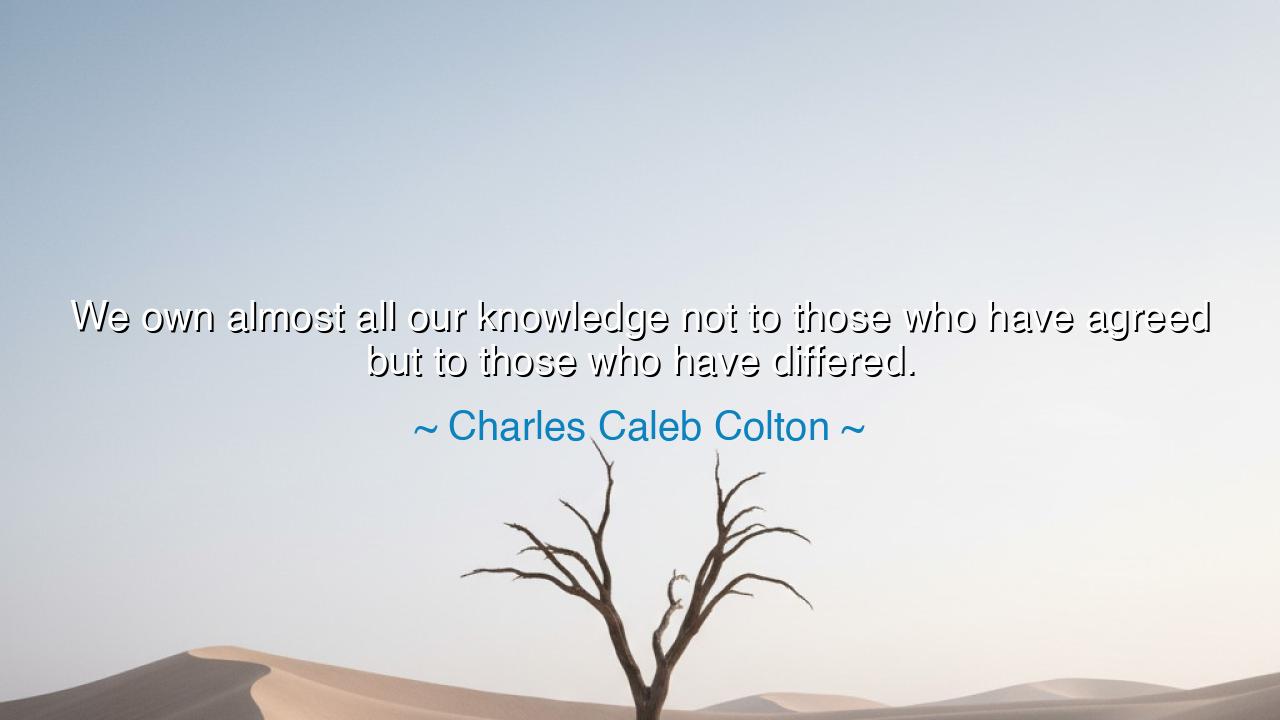
We own almost all our knowledge not to those who have agreed but
We own almost all our knowledge not to those who have agreed but to those who have differed.






Hear the words of Charles Caleb Colton, the sharp mind of the nineteenth century, who declared: “We owe almost all our knowledge not to those who have agreed but to those who have differed.” This is not a mere observation of debate, but a profound revelation of the power of conflict, of contrast, of resistance. For it is not the smooth surface that sharpens the blade, but the rough stone. It is not agreement that stretches the mind, but disagreement that awakens it from slumber.
To live only among those who agree is to sit within a circle of mirrors, seeing your own thoughts reflected back without change. It is comfort, yes, but it is the comfort of stagnation. True knowledge is born in the clash, in the fire of dispute, in the struggle between ideas that seem irreconcilable. When two wills or two minds differ, sparks are struck, and from those sparks a brighter light is kindled. Thus Colton reminds us that progress is not born from sameness, but from the fertile soil of difference.
Consider the tale of Galileo Galilei, who differed with the mighty voices of his age. The world declared that the sun circled the earth, and many agreed in safety and ease. Yet Galileo looked through his telescope and dared to say otherwise. For this he was opposed, threatened, and silenced. But through his defiance, through his willingness to differ, he gave to the world a greater truth—that the earth itself moves in the dance of the heavens. Here lies the living example of Colton’s wisdom: it was not agreement that advanced astronomy, but the courage of one man to stand against it.
History is filled with such battles. Martin Luther differed from the might of Rome, nailing his theses to the church door, and through that act reshaped the spiritual destiny of nations. Rosa Parks differed from unjust law when she refused to surrender her seat, and from her defiance arose a civil rights movement that would transform America. Each of these moments teaches us that when one dares to stand apart, to resist, to challenge, the world itself is moved forward.
Colton’s words also carry a lesson for the seeker of wisdom: do not despise those who disagree with you. They are not always enemies, but often hidden teachers. The voice that contradicts you may be the very voice that reveals your blind spot, that forces you to sharpen your reason, to test your belief, to refine your truth. Agreement soothes the ego, but disagreement strengthens the mind. Therefore, cherish not only the ally who nods, but also the challenger who shakes you.
The lesson, then, is clear: if you would grow in knowledge, do not fear difference. Seek out the debate, the unfamiliar perspective, the contradiction. Stand firm when you must, but listen deeply when opposed, for wisdom often hides in the words of those who unsettle you. The river carves the rock not by agreement but by resistance, and so too does truth carve the mind through friction.
And what must you do in your own life? Welcome dialogue with those unlike you. Read the words of those who see the world differently. Ask questions not only of those who confirm your path, but of those who walk another. And when conflict arises, do not shrink from it—use it as the whetstone for your own thoughts. For in this way, you will not only gain knowledge, but wisdom.
Thus let Colton’s teaching echo like a timeless law: we do not owe our greatest truths to the multitude who agreed, but to the few who differed. Remember this, and honor those brave enough to stand apart. For in their courage, the world was awakened, and in their difference, humanity was lifted higher.






AAdministratorAdministrator
Welcome, honored guests. Please leave a comment, we will respond soon